DON KORENKO
Introduction

Even though the Bible has been around for centuries, many people do not believe in the Bible, and even many Christians find fault with parts of the Bible. Scholars pull it apart and analyze every single word and write hundreds of books about it. Scoffers find items that don’t agree and claim that the Bible is full of errors and can’t be trusted. People pull texts out of context to prove their theories, with one person proving something is white while another person proves it is black using different texts.
So, what is the Bible? Is it the Word of God or is it a bunch of stories and theories made up by various authors and grouped together into a compilation of writings called the Bible?
It’s Up To You
Only you can decide for yourself whether or not the Bible is the Word of God and whether or not it is inspired. God leaves room for doubt. There is nothing in this world that you can say with certainty. There is doubt in every facet of life. If everything was certain, there would be no room for faith. Faith is believing in something when you don’t have all the facts, however, blind faith is no more than presumption and is based on nothing or almost nothing. Faith must have a basis or be built on a foundation.
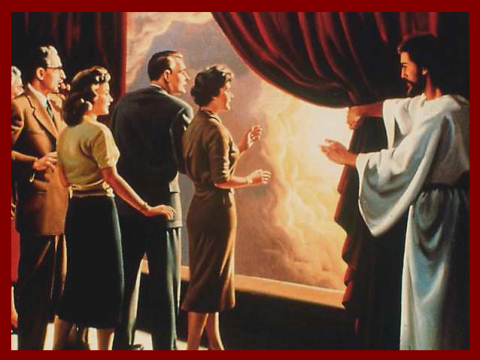
The purpose of this lesson is to give enough facts to prove that there is a basis for you to have faith that the Bible is inspired. Can we prove that every word of the Bible is inspired? No. But that’s where faith comes in. It’s like the old adage, “You can lead a horse to water, but you can’t make him drink.” If you are truly searching for the truth, you will find it in the Bible. If you are looking for proof to tear down the Bible, you will find that too. It all depends on you. But since you are reading this, it is obvious that you realize that you have a need for something more than you already have. Allow God and the Holy Spirit to work with you as you continue to study these lessons.
God has given us a glimpse into the future. Would you like to take a look?
Before We Start
Never start a Bible study without asking God to guide you and show you what He wants you to know. If you are not used to praying, here is a short prayer you can use. “Dear Jesus, as I sit down to study your word, please give me the Holy Spirit in my heart to guide me. Help me to understand the prophecies that I am studying, and show me what you want me to do. Amen”
When Was Daniel Written?
The study today centers around the book of Daniel. The story happens about 2,600 years ago starting at 605 B.C. Because of the historical detail provided in the book of Daniel, scoffers have tried to discredit the writer. Some tried to say that he actually lived hundreds of years later, and instead of foretelling the future, he wrote about the past. But, even given that possibility, they still could not explain how he continued to provide so many accurate details in the future beyond the time they claimed he lived. In addition, Daniel wrote about people and events that had no archeological evidence at the time. However, many archeological finds in the recent past have proven without a doubt that Daniel did live in Babylon, in the time of king Nebuchadnezzar.
Who Is Daniel?
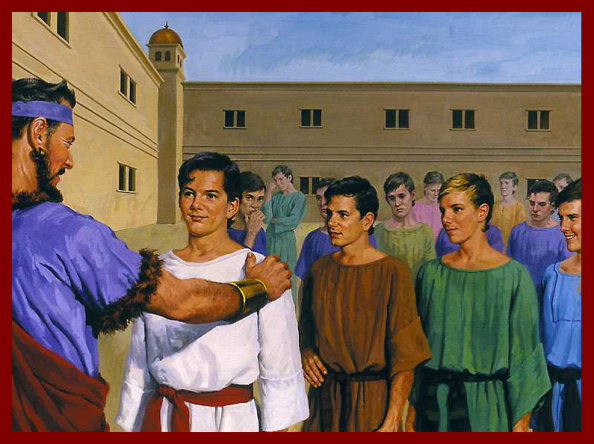
Around 605 B.C., the Babylonian king Nebuchadnezzar, conquered the city of Jerusalem and captured the kingdom of Judah. Among the princes that he captured was a Jewish youth, probably about 18-20 years old, named Daniel. Nebuchadnezzar was forward thinking for his time and instead of making slaves out of all his captives, he took the sharpest and most promising captives and trained them in his own courts to be administrators, teachers, wise men,
etc. You can read the first chapter of Daniel to get an idea of what happened.
The King’s Dream
The second chapter of Daniel recounts the story of a dream that God gave king Nebuchadnezzar. Read Daniel 2:1-13 to get the details.
Dan 2:1 And in the second year of the reign of Nebuchadnezzar, Nebuchadnezzar dreamed dreams, wherewith his spirit was troubled, and his sleep brake from him. 2 Then the king commanded to call the magicians, and the astrologers, and the sorcerers, and the Chaldeans,
for to shew the king his dreams. So they came and stood before the king. 3 And the king said unto them, I have dreamed a dream, and my spirit was troubled to know the dream. 4 Then spake the Chaldeans to the king in Syriack, O king, live for ever: tell thy servants the dream, and we will shew the interpretation. The king answered and said to the Chaldeans, The thing is gone from me: if ye will not make known unto me the dream, with the interpretation thereof, ye shall be cut in pieces, and your houses shall be made a dunghill. 6 But if ye shew the dream, and the interpretation thereof, ye shall receive of me gifts and rewards and great honour: therefore shew me the dream, and the interpretation thereof. 7 They answered again and said, Let the king tell his servants the dream, and we will shew the interpretation of it. 8 The king answered and said, I know of certainty that ye would gain the time, because ye see the thing is gone from me. 9 But if ye will not make known unto me the dream, there is but one decree for you: for ye have prepared lying and corrupt words to speak before me, till the time be changed: therefore tell me the dream, and I shall know that ye can shew me the interpretation thereof. 10 The Chaldeans answered before the king, and said, There is not a man upon the earth that can shew the king's matter: therefore there is no king, lord, nor ruler, that asked such things at any magician, or astrologer, or Chaldean. 11 And it is a rare thing that the king requireth, and there is none other that can shew it before the king, except the gods, whose dwelling is not with 4lesh. 12 For this cause the king was angry and very furious, and commanded to destroy all the wise men of Babylon. 13 And the decree went forth that the wise men should be slain; and they sought Daniel and his fellows to be slain.
Note especially the response of the wise men in verses 10 and 11. Even they knew that no man alive could do what the king asked and only the gods had that power. In those times, the kings were part of the religious system and had many priests for each of the many gods that they worshipped. It is interesting to note that all of these priests and even the king, could not get an answer from any of their gods.
Daniel Volunteers
Continue reading Daniel 2:14-16.
Dan 2:14 Then Daniel answered with counsel and wisdom to Arioch the captain of the king's guard, which was gone forth to slay the wise men of Babylon: 15 He answered and said to Arioch the king's captain, Why is the decree so hasty from the king? Then Arioch made the thing known to Daniel. 16 Then Daniel went in, and desired of the king that he would give him time, and that he would shew the king the interpretation.
We see that Daniel asked for time. Continue with verses 17-23.
17 Then Daniel went to his house, and made the thing known to Hananiah, Mishael, and Azariah, his companions: 18 That they would desire mercies of the God of heaven concerning this secret; that Daniel and his fellows should not perish with the rest of the wise men of Babylon. 19 Then was the secret revealed unto Daniel in a night vision. Then Daniel blessed the God of heaven. 20 Daniel answered and said, Blessed be the name of God for ever and ever: for wisdom and might are his: 21 And he changeth the times and the seasons: he removeth kings, and setteth up kings: he giveth wisdom unto the wise, and knowledge to them that know understanding: 22 He revealeth the deep and secret things: he knoweth what is in the darkness, and the light dwelleth with him. 23 I thank thee, and praise thee, O thou God of my fathers, who hast given me wisdom and might, and hast made known unto me now what we desired of thee: for thou hast now made known unto us the king's matter.
Note that the first thing Daniel did was to gather with his friends and pray to God for an answer. God did not disappoint him, and Daniel was so thankful that he thanks God and praises Him for answering his prayer. Many times, we take everything for granted and forget to thank God for even the breath that we take each second. Continue reading verses 24-30.
Dan 2:24 Therefore Daniel went in unto Arioch, whom the king had ordained to destroy the wise men of Babylon: he went and said thus unto him; Destroy not the wise men of Babylon: bring me in before the king, and I will shew unto the king the interpretation. 25 Then Arioch brought in Daniel before the king in haste, and said thus unto him, I have found a man of the captives of Judah, that will make known unto the king the interpretation. 26 The king answered and said to Daniel, whose name was Belteshazzar, Art thou able to make known unto me the dream which I have seen, and the interpretation thereof? 27 Daniel answered in the presence of the king, and said, The secret which the king hath demanded cannot the wise men, the astrologers, the magicians, the soothsayers, shew unto the king; 28 But there is a God in heaven that revealeth secrets, and maketh known to the king Nebuchadnezzar what shall be in the latter days. Thy dream, and the visions of thy head upon thy bed, are these; 29 As for thee, O king, thy thoughts came into thy mind upon thy bed, what should come to pass hereafter: and he that revealeth secrets maketh known to thee what shall come to pass. 30 But as for me, this secret is not revealed to me for any wisdom that I have more than any living, but for their sakes that shall make known the interpretation to the king, and that thou mightest know the thoughts of thy heart.
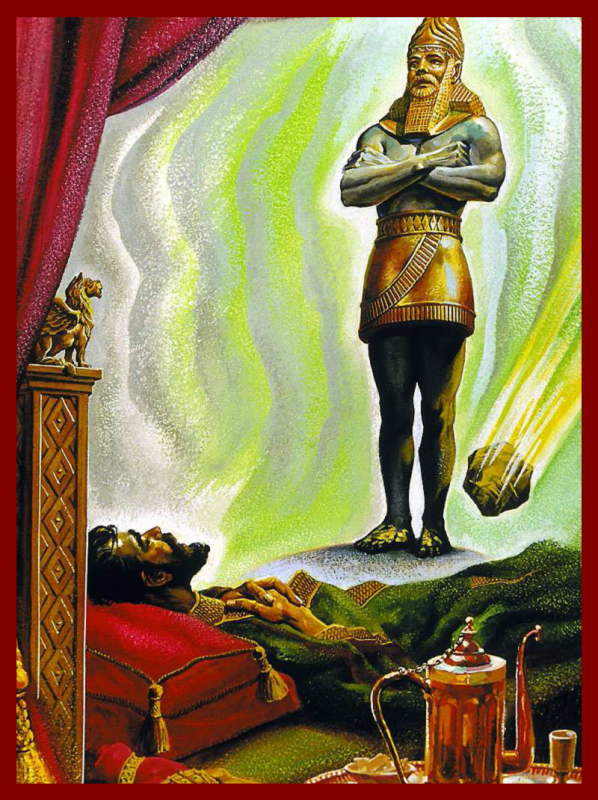
Notice that Daniel does not take any credit and plainly specifies that no one is able to give the king his answer except the God in heaven. In verse 30, he makes it plain that he was not wiser than anyone else but that God gave him the answer to give to the king.
The Details of the Dream
Read Verses 31-36. The king’s dream was about a large statue.
Dan 2:31 Thou, O king, sawest, and behold a great image. This great image, whose brightness was excellent, stood before thee; and the form thereof was terrible. 32 This image's head was of 4ine gold, his breast and his arms of silver, his belly and his thighs of brass, 33 His legs of iron, his feet part of iron and part of clay. 34 Thou sawest till that a stone was cut out without hands, which smote the image upon his feet that were of iron and clay, and brake them to pieces. 35 Then was the iron, the clay, the brass, the silver, and the gold, broken to pieces together, and became like the chaff of the summer threshing floors; and the wind carried them away, that no place was found for them: and the stone that smote the image became a great mountain, and filled the whole earth. 36 This is the dream; and we will tell the interpretation thereof before the king.
Note that as you progress down the statue, the value of the metal decreases, gold, silver, brass, iron. One other obvious fact, there are two arms and legs and ten toes, which becomes important as we talk about what it represents. There is a reason why a statue of a man is given in the dream.
The Interpretation
Read Verses 37-45.
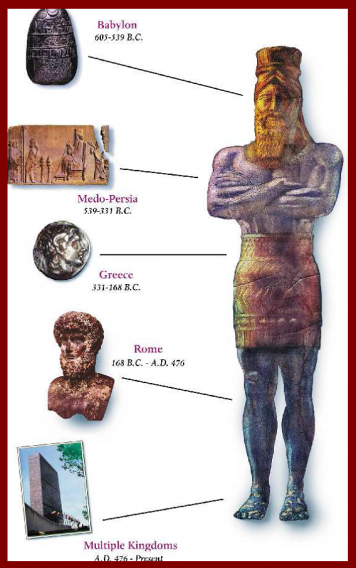
Dan 2:37 Thou, O king, art a king of kings: for the God of heaven hath given thee a kingdom, power, and strength, and glory. 38 And where ever the children of men dwell, the beasts of the field and the fowls of the heaven hath he given into thine hand, and hath made thee ruler over them all. Thou art this head of gold. 39 And after thee shall arise another kingdom inferior to thee, and another third kingdom of brass, which shall bear rule over all the earth. 40 And the fourth kingdom shall be strong as iron: forasmuch as iron breaketh in pieces and subdueth all things: and as iron that breaketh all these, shall it break in pieces and bruise. 41 And whereas thou sawest the feet and toes, part of potters' clay, and part of iron, the kingdom shall be divided; but there shall be in it of the strength of the iron, forasmuch as thou sawest the iron mixed with miry clay. 42 And as the toes of the feet were part of iron, and part of clay, so the kingdom shall be partly strong, and partly broken. 43 And whereas thou sawest iron mixed with miry clay, they shall mingle themselves with the seed of men: but they shall not cleave one to another, even as iron is not mixed with clay. 44 And in the days of these kings shall the God of heaven set up a kingdom, which shall never be destroyed: and the kingdom shall not be left to other people, but it shall break in pieces and consume all these kingdoms, and it shall stand for ever. 45 Forasmuch as thou sawest that the stone was cut out of the mountain without hands, and that it brake in pieces the iron, the brass, the clay, the silver, and the gold; the great God hath made known to the king what shall come to pass hereafter: and the dream is certain, and the interpretation thereof sure.
The statue represents kingdoms and powers. Daniel starts out by telling the king that he is the head of gold, so the head of gold represents Babylon. Now, at this point Daniel is taking his life in his hands because no ruler wants to hear that his kingdom will be replaced by another, more inferior kingdom. But then Daniel says that the second kingdom will be replaced by a third and then a fourth. Notice that there is no fifth kingdom. The fifth power is made up of the ten toes made of iron and clay, that cannot stick to each other, which means no one power over the whole civilized world. Now we know that there were other civilizations at the time such as the Chinese, but if you believe the Bible that the birthplace of civilization was in the Middle East and other peoples such as the Asians and Africans started there and migrated away, then these other cultures were more isolated from the rest of the world.
Now it makes sense, from Daniel’s point of view, that if there are four kingdoms, there should be a sixth, seventh, etc., doesn’t it? But Daniel says there will only be four major world powers, starting with Babylon, followed by a kingdom that can’t stick together. On top of that, God’s kingdom, a stone made without human hands, comes along and utterly destroys the other kingdoms and fills the world with His glory. What are the chances of getting all these items right? In a minute, we will see that everything except the big stone has already happened. So if everything else has happened, doesn’t it make sense that sooner or later the big stone will come as Daniel has predicted?
What Does History Say?
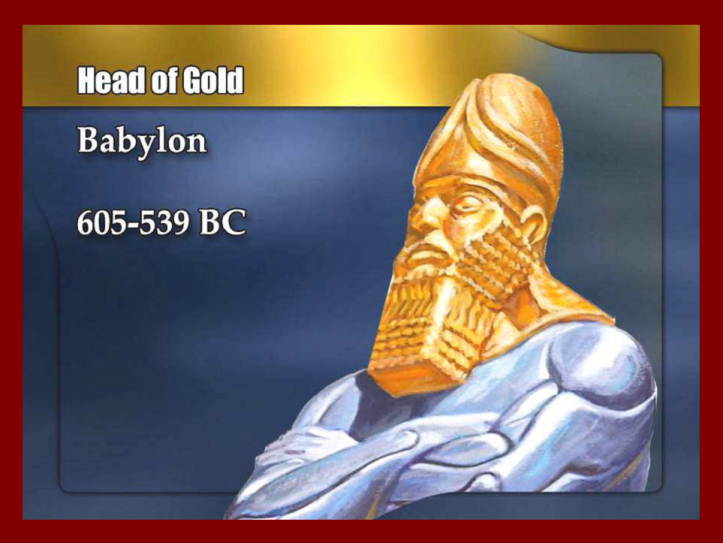
Babylon was a kingdom known for its luxury and gold and at one time was reputed to house The Hanging Gardens, one of the Seven Wonders of the World. Babylon dates from 605 B.C. to 539 B.C.
Babylon was overthrown by Medo-Persia in 539 B.C. Note that there were two powers in this kingdom, the Medes and the Persians. In the statue, this kingdom is represented by the two arms. The kingdom was also well known for its use of silver. The Medo-Persia kingdom started with the Medes in power and by 500 B.C., the Persian kings had risen to power. At one time, 44% of the world’s population was ruled by this empire.
Medo-Persia was in turn conquered by Alexander the Great of Greece in 330 B.C. Note that the Greeks were well known for their use of brass, especially in their armor.
After Greece came Rome. Rome defeated Greece over a period of years so that one specific date is hard to pin down. The conquest of Greece started in the mid 100’s B.C. and ended in 30 B.C. Rome was known as the iron kingdom because it was rapacious in its conquests, killing people or subduing them into slavery.
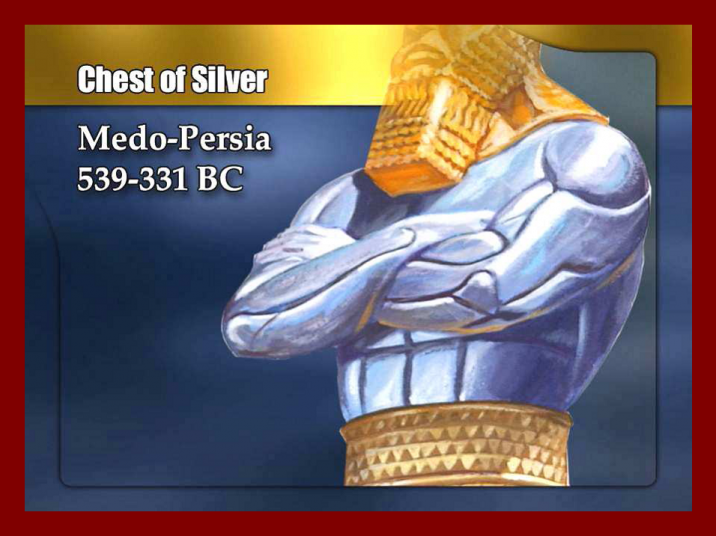
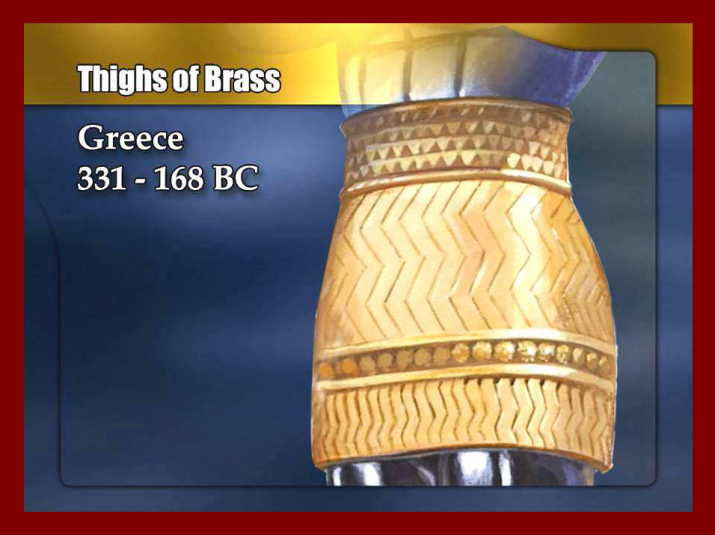
Now just as the statue had two legs, the Roman Empire was made up of two parts. Pagan Rome gave way to Papal Rome in 538 A.D. From 538 to 1798 A.D. the papacy was the government. However, at the same time, the Roman Empire was broken into ten tribes, with three of the tribes later being vanquished and the papal power continuing its government over the remaining seven. These tribes became the various countries in Europe. Attempts to unite Europe by marriage and intermarriage have proved fruitless and so today we do not have any one dominating world power.
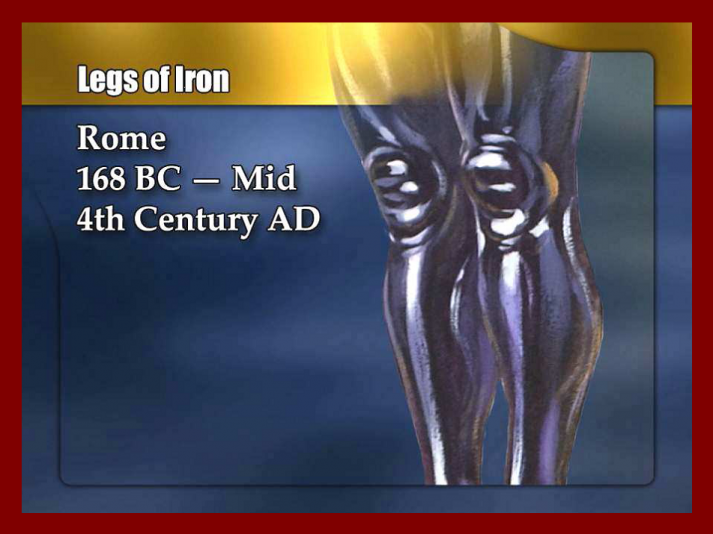
Which leaves us in the toes of the image.
Note that the two legs represent two phases of the same kingdom, Rome, just as the two arms
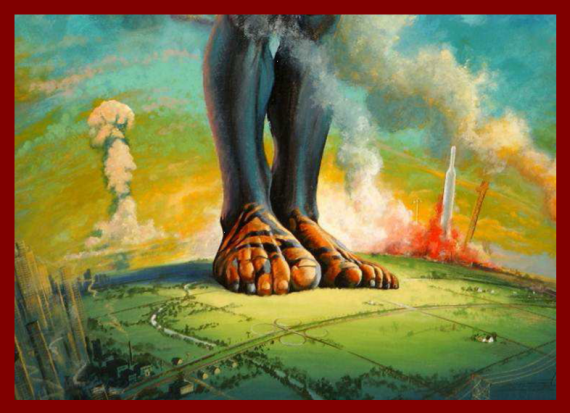
represented the two phases of the Medo-Persia kingdom. This is important to remember as we get into further prophetic visions.
A Concise Picture
This dream in Daniel 2 gives us a very broad picture of the scope of history. Everything that Daniel predicted to date has happened. Before we look at two other prophecies, let’s look at a biblical rule about prophecies. One of the rules about prophecy in the Bible is that later prophecies give nothing new, only more details about the first prophecy.
Now are you ready to get into the details? Believe it or not, God gives Daniel some very specific details in some later visions. These visions are found in Daniel 7 and 8. Daniel 9-11 are additional visions to explain to Daniel the events of the vision of Daniel 8.
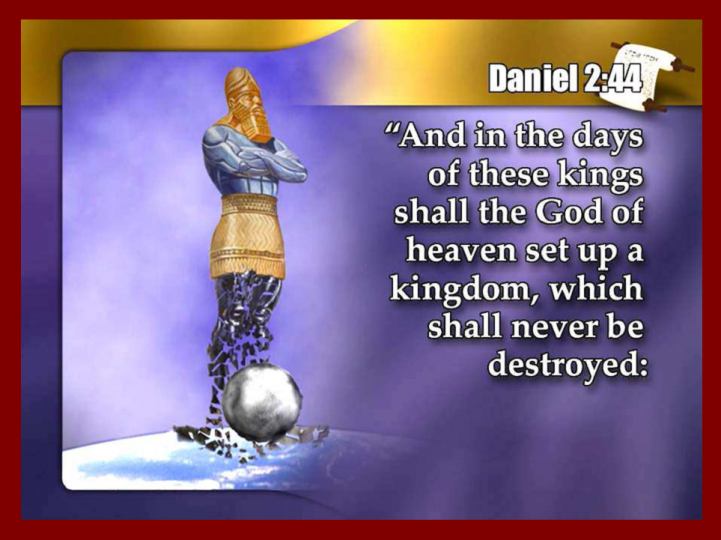
A Word About Prophecy Interpretation
Before we get into the next two visions, let’s look at three ways of interpreting prophecy. These three ways are called Historicism, Futurism and Preterism.
Up to the 1500’s A.D., historicism was the only method of interpreting prophecy. We will not go into detail at this point because a future study will show how and why the other two methods developed, who authored the methods, and how it changes what we believe. The Bible studies presented here, are all based on the historicism principle of interpreting prophecy.
Some commentators and commentaries will interpret the next two visions differently because they follow either futurism, preterism or a combination of the two. If you read one of these commentaries, try comparing their writings with other commentaries to get a balanced view and use your own mind to decide what makes more sense.
Belshazzar’s Feast
If you read Daniel chapters, 5 and 6, you will see the transition from the Babylon kingdom to the Medo-Persian kingdom.
The Vision of Daniel 7
Note that we are going back in time, before Medo-Persia conquers Babylon. Chapters 5 and 6 give some history and then Daniel records his prophetic visions. Daniel 7:1-14 is the vision given to Daniel. Read these verses before continuing with this study.
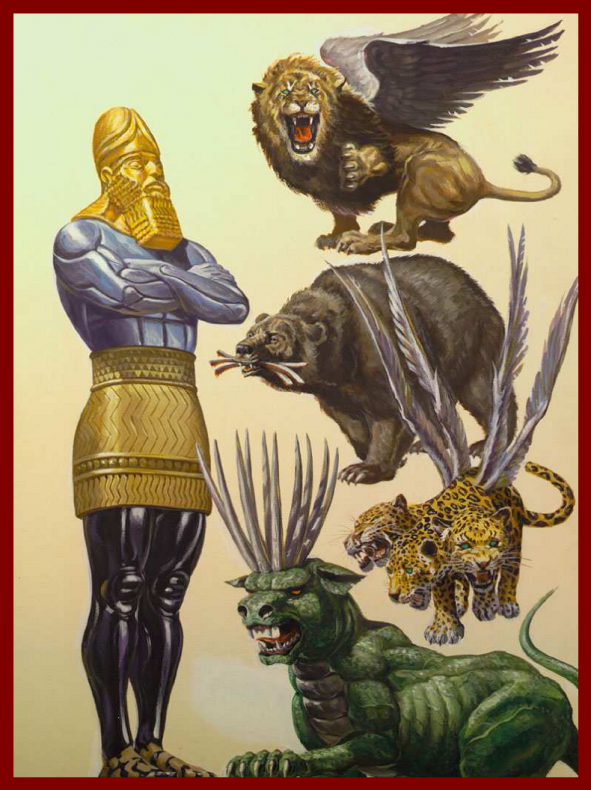
Dan 7:1 In the first year of Belshazzar king of Babylon Daniel had a dream and visions of his head upon his bed: then he wrote the dream, and told the sum of the matters. 2 Daniel spake and said, I saw in my vision by night, and, behold, the four winds of the heaven strove upon the great sea. 3 And four great beasts came up from the sea, diverse one from another. 4 The first was like a lion, and had eagle's wings: I beheld till the wings thereof were plucked, and it was lifted up from the earth, and made stand upon the feet as a man, and a man's heart was given to it. 5 And behold another beast, a second, like to a bear, and it raised up itself on one side, and it had three ribs in the mouth of it between the teeth of it: and they said thus unto it, Arise, devour much flesh. 6 After this I beheld, and lo another, like a leopard, which had upon the back of it four wings of a fowl; the beast had also four heads; and dominion was given to it. 7 After this I saw in the night visions, and behold a fourth beast, dreadful and terrible, and strong exceedingly; and it had great iron teeth: it devoured and brake in pieces, and stamped the residue with the feet of it: and it was diverse from all the beasts that were before it; and it had ten horns. 8 I considered the horns, and, behold, there came up among them another little horn, before whom there were three of the 4irst horns plucked up by the roots: and, behold, in this horn were eyes like the eyes of man, and a mouth speaking great things. 9 I beheld till the thrones were cast down, and the Ancient of days did sit, whose garment was white as snow, and the hair of his head like the pure wool: his throne was like the 4iery flame, and his wheels as burning fire. 10 A fiery stream issued and came forth from before him: thousand thousands ministered unto him, and ten thousand times ten thousand stood before him: the judgment was set, and the books were opened. 11 I beheld then because of the voice of the great words which the horn spake: I beheld even till the beast was slain, and his body destroyed, and given to the burning flame. 12 As concerning the rest of the beasts, they had their dominion taken away: yet their lives were prolonged for a season and time. 13 I saw in the night visions, and, behold, one like the Son of man came with the clouds of heaven, and came to the Ancient of days, and they brought him near before him.
Now lets compare the dream of the statue with Daniel’s vision. Although different symbols are used, there are many similarities between the two.
Comparing Daniel 2 and Daniel 7
Notice that when you compare the two chapters side by side, the vision of Daniel is remarkably similar to the king’s dream. However, we have additional detail in Daniel’s vision that we did not have in the king’s dream. If you read the rest of the chapter, Daniel is told what the vision represents.
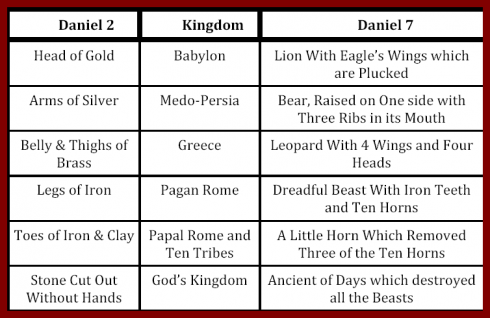
Comparing History with Daniel 7
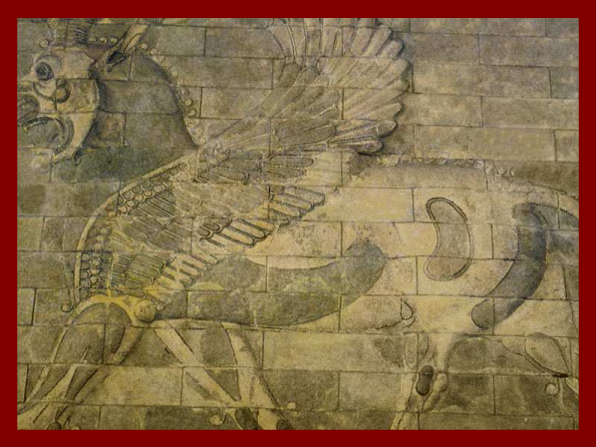
Babylon was noted for using the winged lion in a lot of its art. Often the lion and eagle were combined with the lion having wings and claws. The reference to the wings being plucked refers to another dream of the king in Daniel 4. You can read what happened in that chapter.
Medo-Persia is represented by the bear which is raised on one side. As stated earlier, the Medes were in power first and later the Persians took over. Many commentators interpret the three ribs as representing three countries taken over by Medo-Persia; Lydia, Babylon and Egypt.
Greece is represented by the leopard with four wings and four heads. Under Alexander the Great, Greece moved swiftly in its conquests, and when Alexander died, the kingdom was split into four parts and ruled by four of his generals, thus the wings denote speed and the four heads, the partition of Greece under the four generals.
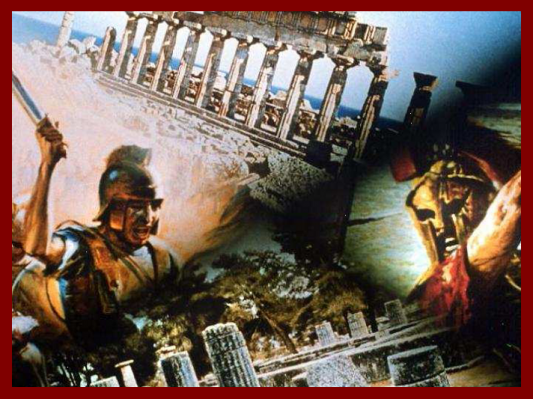
The dreadful beast with iron teeth parallels the iron legs of the image and represents the pagan Roman Empire. The little horn comes out of the beast and is the other phase of the Roman Empire, Papal Rome. Notice that in verse 8, the little horn is given only one verse to identify it, but the interpretation of the little horn is given four verses; 20-21 and 24-25.
Dan 7:20 And of the ten horns that were in his head, and of the other which came up, and before whom three fell; even of that horn that had eyes, and a mouth that spake very great things, whose look was more stout than his fellows. 21 beheld, and the same horn made war with the saints, and prevailed against them;
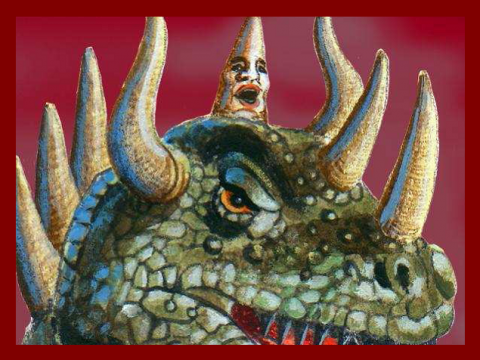
Dan 7:24 And the ten horns out of this kingdom are ten kings that shall arise: and another shall rise after them; and he shall be diverse from the first, and he shall subdue three kings. 25 And he shall speak great words against the most High, and shall wear out the saints of the most High, and think to change times and laws: and they shall be given into his hand until a time and times and the dividing of time.
The interpretation that the little horn was Antiochus Epiphanes IV, a Seleucid king, and the 4th kingdom is Greece and not Rome, was first advanced by a pagan defender and neoplatonist, Porphyry (c. A.D. 233-304). He was alarmed at the spread of Christianity and was one of those who contended that Daniel was written in the 2nd century B.C. not the 6th. Although a king, and he did fulfill some of the parts of the prophecy, his power was not as far reaching as a kingdom, plus his rulership was at the beginning of Pagan Rome not succeeding Pagan Rome. It has subsequently been proven that Antiochus could not possibly _it all the criteria found in this chapter. This interpretation was discarded by Protestantism until brought out of its obscurity by Hugh Broughton (1549–1612) of England. It is now accepted in most modern commentaries not following the historicist view of prophecy.
The Vision of Daniel 8
In Daniel chapter eight, Daniel records another vision that parallels what we have studied so far. Read Daniel 8:1-14.
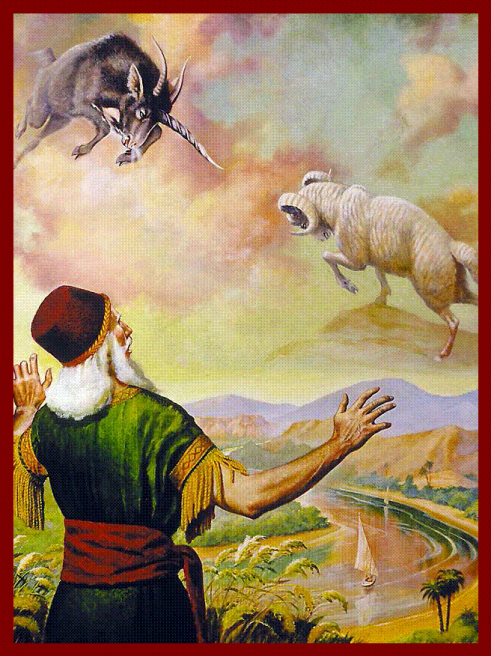
Dan 8:1 In the third year of the reign of king Belshazzar a vision appeared unto me, even unto me Daniel, after that which appeared unto me at the first. 2 And I saw in a vision; and it came to pass, when I saw, that I was at Shushan in the palace, which is in the province of Elam; and I saw in a vision, and I was by the river of Ulai. 3 Then I lifted up mine eyes, and saw, and, behold, there stood before the river a ram which had two horns: and the two horns were high; but one was higher than the other, and the higher came up last. 4 I saw the ram pushing westward, and northward, and southward; so that no beasts might stand before him, neither was there any that could deliver out of his hand; but he did according to his will, and became great. 5 And as I was considering, behold, an he goat came from the west on the face of the whole earth, and touched not the ground: and the goat had a notable horn between his eyes. 6 And he came to the ram that had two horns, which I had seen standing before the river, and ran unto him in the fury of his power. 7 And I saw him come close unto the ram, and he was moved with choler against him, and smote the ram, and brake his two horns: and there was no power in the ram to stand before him, but he cast him down to the ground, and stamped upon him: and there was none that could deliver the ram out of his hand. 8 Therefore the he goat waxed very great: and when he was strong, the great horn was broken; and for it came up four notable ones toward the four winds of heaven. 9 And out of one of them came forth a little horn, which waxed exceeding great, toward the south, and toward the east, and toward the pleasant land. 10 And it waxed great, even to the host of heaven; and it cast down some of the host and of the stars to the ground, and stamped upon them. 11 Yea, he magni4ied himself even to the prince of the host, and by him the daily sacri4ice was taken away, and the place of his sanctuary was cast down. 12 And an host was given him against the daily sacri4ice by real son of transgression, and it cast down the truth to the ground; and it practiced, and prospered. 13 Then I heard one saint speaking, and another saint said unto that certain saint which spake, How long shall be the vision concerning the daily sacri4ice, and the transgression of desolation, to give both the sanctuary and the host to be trodden under foot? 14 And he said unto me, Unto two thousand and three hundred days; then shall the sanctuary be cleansed.
Another rule of prophecy is that prophecy starts at the present time of the prophet. You will notice that there is something missing in this vision; Babylon. Babylon is exiting the scene of history and Medo-Persia is getting ready to take over so more details on Babylon are irrelevant. Note that we now also have a 2300 day prophecy, which we will cover in a later lesson. If you read verses 15-27, you will see the interpretation of this vision as given to Daniel by Gabriel.
Dan 8:15 And it came to pass, when I, even I Daniel, had seen the vision, and sought for the meaning, then, behold, there stood before me as the appearance of a man. 16 And I heard a man's voice between the banks of Ulai, which called, and said, Gabriel, make this man to understand the vision. 17 So he came near where I stood: and when he came, I was afraid, and fell upon my face: but he said unto me, Understand, O son of man: for at the time of the end shall be the vision. 18 Now as he was speaking with me, I was in a deep sleep on my face toward the ground: but he touched me, and set me upright. 19 And he said, Behold, I will make thee know what shall be in the last end of the indignation: for at the time appointed the end shall be. 20 The ram which thou sawest having two horns are the kings of Media and Persia. 21 And the rough goat is the king of Grecia: and the great horn that is between his eyes is the first king. 22 Now that being broken, whereas four stood up for it, four kingdoms shall stand up out of the nation, but not in his power. 23 And in the latter time of their kingdom, when the transgressors are come to the full, a king of fierce countenance, and understanding dark sentences, shall stand up. 24 And his power shall be mighty, but not by his own power: and he shall destroy wonderfully, and shall prosper, and practice, and shall destroy the mighty and the holy people. 25 And through his policy also he shall cause craft to prosper in his hand; and he shall magnify himself in his heart, and by peace shall destroy many: he shall also stand up against the Prince of princes; but he shall be broken without hand. 26 And the vision of the evening and the morning which was told is true: wherefore shut thou up the vision; for it shall be for many days. 27 And I Daniel fainted, and was sick certain days; afterward I rose up, and did the king's business; and I was astonished at the vision, but none understood it.
Comparing History With Daniel 8
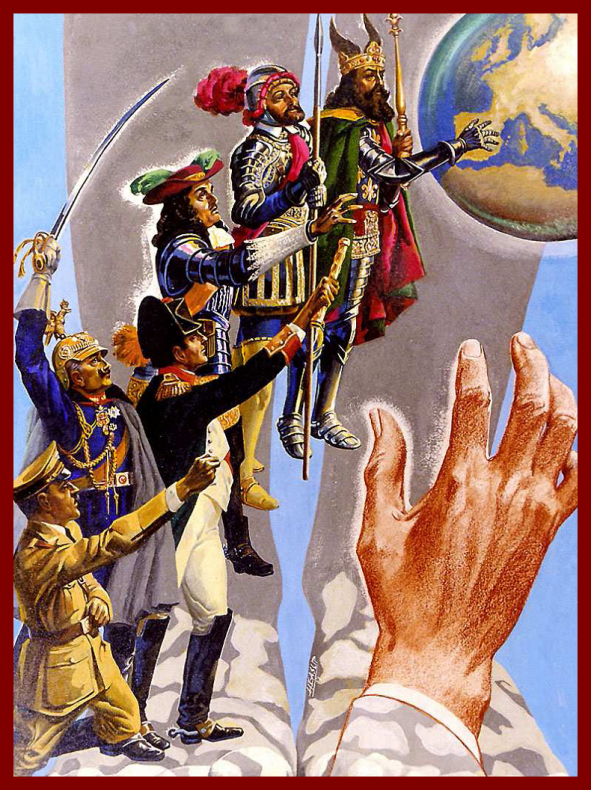
You will see that there is basically nothing new or different from Daniel 7 concerning Medo-Persia. It is a two phased kingdom, with the Medes starting and the Persians ascending to power at a later date. Instead of three ribs, you have the three directions where they expanded. Verse 20 specifically identifies this beast as Medo-Persia.
In this vision, we are given more identifying marks of Greece in addition to verse 21 which tells us that the goat represents Greece. The first king, Alexander the Great, conquers Medo-Persia, dies and is replaced by his four generals.
From one of these four Grecian States, another exceeding great power (the little horn) arises and grows to the south, the east and the pleasant land (Palestine). If you read verses 23-25, you get a description of this king that matches the indescribable beast of Daniel 7. It cast down some of the host (Christian persecutions) and magnified himself even to the Prince of the host (Rome crucified Jesus). So we can see the development of Pagan Rome out of Greece. Verse 25 talks about the downfall of Pagan Rome, but it is not conquered by another power (broken without hand).
The power continues with the destruction of the daily and the sanctuary and the truth. Note that these are all spiritual in nature as opposed to the literal persecutions, so you have the transition from Pagan Rome to Papal Rome in verses 11-12.
Comparing The Visions of Daniel 7 & 8
As you study these two chapters in detail, you can definitely see the similarities. One of the main differences though appears to be the number of kingdoms presented in the two chapters. Daniel 7 has four kingdoms and four different beasts while Daniel 8 appears to have only two beasts and two kingdoms. If you remove Babylon from Daniel 7, you still have three kingdoms versus 2 in Daniel 7.
As you look at the beasts in Daniel 7, from the Jewish standpoint, these beasts were all unclean beasts. In Daniel 8, the ram and the goat were animals that the Jews ate but also animals that were used in their daily sanctuary services (see the book of Leviticus 1-10).
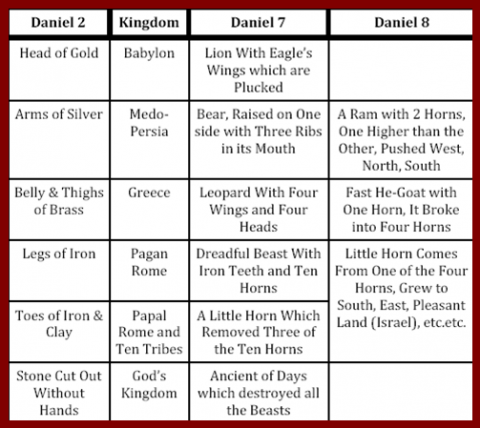
The vision of Daniel 7 focuses primarily of the political aspect of the kingdoms. Daniel 8, however, focuses on the spiritual development of the kingdoms. Roman philosophy developed out of the Grecian philosophy and both continue to be part of the western culture. These philosophies permeate our religious thinking even to this day.
So the kingdom of the he-goat gives rise to the spiritual thinking starting in Greece, moving to Rome and continuing to the present.
Review
As we look back at these prophecies that God gave Daniel, over 2,600 years ago, what more proof do we need that;
1. God is in control
2. God knows the future
3. The outcome is certain
How Does This Show God’s Love?
God does not want us to be lost. He loves us to such an extent that He wants us to know what is going to happen in the future. He gave us over 2,600 years of history ahead of time so we would know that He does control the future. Jeremiah 29:11 says,
“For I know the plans I have for you, declares the LORD, plans to prosper you and not to harm you, plans to give you hope and a future.” (NIV)
God made us free moral agents to make our own decisions. He does not force Himself in your life but He will continue to remind you that He is there. You can choose to ignore Him, and if you do it often enough, He will respect your wishes and leave you alone. Today you can choose to follow Him and be part of His plans and His future for you.
More Detail
If you really like history, Daniel chapters 10 and 11 record a third vision of Daniel with extreme amounts of detail concerning the time from the Pagan Roman Empire, through the time of the ten tribes, until the end, but space here does not permit dealing with this vision. C. Mervyn Maxwell, has written two volumes called God Cares. Volume One deals with Daniel and Volume Two deals with Revelation. These volumes go into much greater detail as far as the history is concerned.
Further Reading
Wikipedia has great articles on Babylon, Nebuchadnezzar, Medo-Persia, etc., plus there are a lots of links to other related articles.
